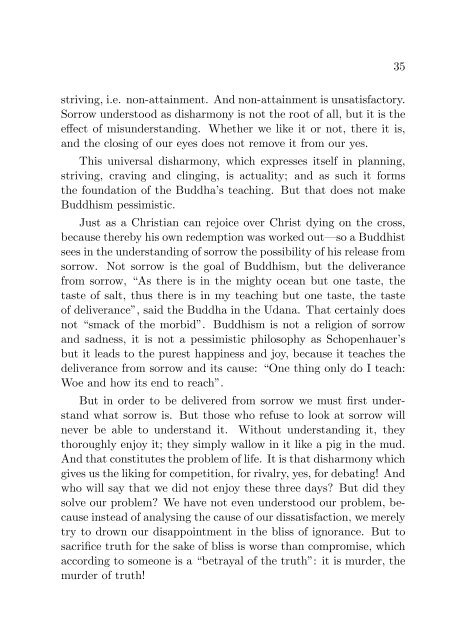Towards the Truth
Notes from a three-day debate in the 1940’s about Buddhism and Christianity.
Notes from a three-day debate in the 1940’s about Buddhism and Christianity.
Create successful ePaper yourself
Turn your PDF publications into a flip-book with our unique Google optimized e-Paper software.
35<br />
striving, i.e. non-attainment. And non-attainment is unsatisfactory.<br />
Sorrow understood as disharmony is not <strong>the</strong> root of all, but it is <strong>the</strong><br />
effect of misunderstanding. Whe<strong>the</strong>r we like it or not, <strong>the</strong>re it is,<br />
and <strong>the</strong> closing of our eyes does not remove it from our yes.<br />
This universal disharmony, which expresses itself in planning,<br />
striving, craving and clinging, is actuality; and as such it forms<br />
<strong>the</strong> foundation of <strong>the</strong> Buddha’s teaching. But that does not make<br />
Buddhism pessimistic.<br />
Just as a Christian can rejoice over Christ dying on <strong>the</strong> cross,<br />
because <strong>the</strong>reby his own redemption was worked out—so a Buddhist<br />
sees in <strong>the</strong> understanding of sorrow <strong>the</strong> possibility of his release from<br />
sorrow. Not sorrow is <strong>the</strong> goal of Buddhism, but <strong>the</strong> deliverance<br />
from sorrow, “As <strong>the</strong>re is in <strong>the</strong> mighty ocean but one taste, <strong>the</strong><br />
taste of salt, thus <strong>the</strong>re is in my teaching but one taste, <strong>the</strong> taste<br />
of deliverance”, said <strong>the</strong> Buddha in <strong>the</strong> Udana. That certainly does<br />
not “smack of <strong>the</strong> morbid”. Buddhism is not a religion of sorrow<br />
and sadness, it is not a pessimistic philosophy as Schopenhauer’s<br />
but it leads to <strong>the</strong> purest happiness and joy, because it teaches <strong>the</strong><br />
deliverance from sorrow and its cause: “One thing only do I teach:<br />
Woe and how its end to reach”.<br />
But in order to be delivered from sorrow we must first understand<br />
what sorrow is. But those who refuse to look at sorrow will<br />
never be able to understand it. Without understanding it, <strong>the</strong>y<br />
thoroughly enjoy it; <strong>the</strong>y simply wallow in it like a pig in <strong>the</strong> mud.<br />
And that constitutes <strong>the</strong> problem of life. It is that disharmony which<br />
gives us <strong>the</strong> liking for competition, for rivalry, yes, for debating! And<br />
who will say that we did not enjoy <strong>the</strong>se three days? But did <strong>the</strong>y<br />
solve our problem? We have not even understood our problem, because<br />
instead of analysing <strong>the</strong> cause of our dissatisfaction, we merely<br />
try to drown our disappointment in <strong>the</strong> bliss of ignorance. But to<br />
sacrifice truth for <strong>the</strong> sake of bliss is worse than compromise, which<br />
according to someone is a “betrayal of <strong>the</strong> truth”: it is murder, <strong>the</strong><br />
murder of truth!
















